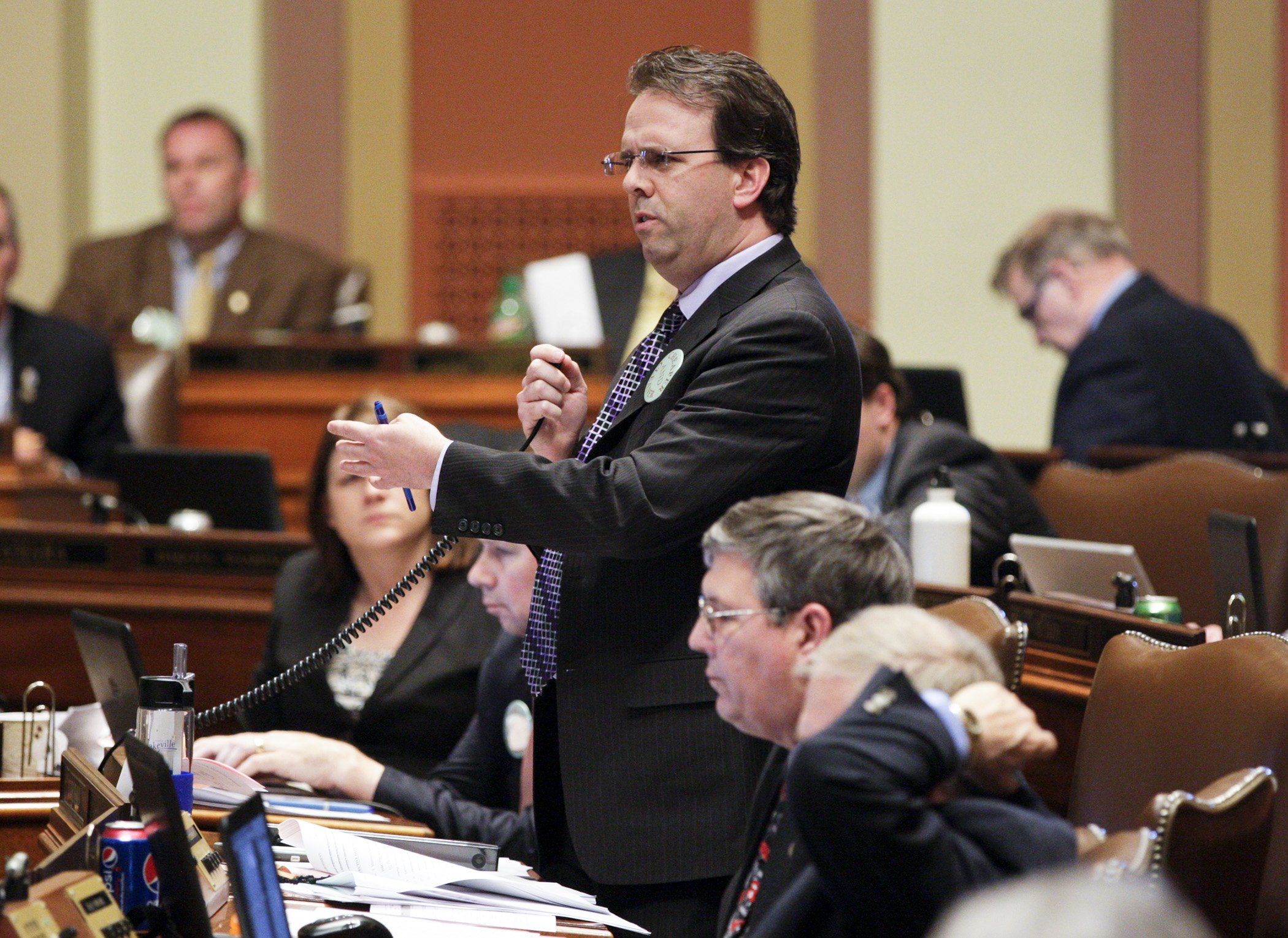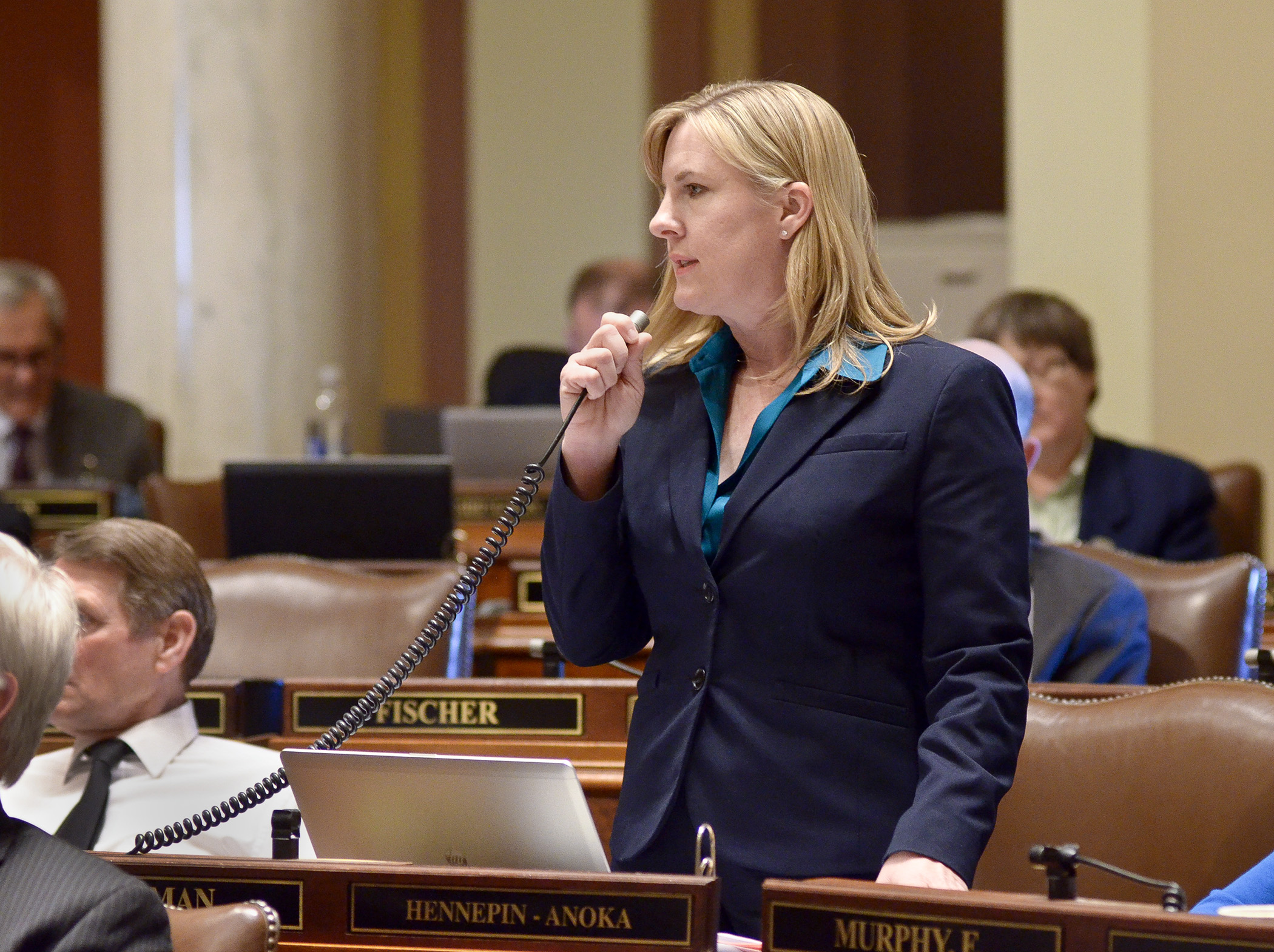House passes $340.47 million jobs and energy bill

The House passed a sprawling omnibus job growth and energy affordability finance bill Wednesday, setting up likely showdowns with the Senate on a wide array of proposed initiatives — from a lower minimum wage for tipped workers to shifts away from state policy favoring solar power.
HF834 HF843 passed 73-56 after more than seven hours of debate on the House Floor that ricocheted between the bill’s two areas of focus: employment- and energy-related issues.
The bill now goes to the Senate with Sen. James Metzen (DFL-South St. Paul) as its sponsor.
Rep. Pat Garofalo (R-Farmington), the bill’s sponsor, likes to call the omnibus bill “176 pages of legislative awesomeness.” The jobs and energy bill grew both in page length and budget size (to $340.47 million) after clearing the House Job Growth and Energy Affordability Policy and Finance Committee, then moving through the House Taxes Committee and finally the House Ways and Means Committee.
Energy provisions
DFLers complained the bill contains provisions not previously heard in committee — among them, putting sunset dates on energy conservation improvement statutes, and letting large hydropower companies meet the state’s renewable energy standards, renamed “advanced energy standards” in the omnibus.
Rep. Erik Simonson (DFL-Duluth) said the bill “drives Minnesota backwards in clean energy policy.”
Rep. Melissa Hortman (DFL-Brooklyn Park) said she has received 900 emails concerned that “this bill repeals all policy efforts intended to mitigate climate change.”
Garofalo countered that the bill received a thorough vetting in the jobs and energy committee which he chairs. The bill would charge a task force with creating new conservation policy, and hydropower would have to be “cheaper and cleaner” — a mantra made into buttons worn by supporters — than solar power to meet the renewable energy standards.
Employment and other provisions
 Rep. Melissa Hortman addresses colleagues on the House floor during the April 22 debate of the omnibus job growth and energy affordability finance bill. Photo by Andrew VonBank
Rep. Melissa Hortman addresses colleagues on the House floor during the April 22 debate of the omnibus job growth and energy affordability finance bill. Photo by Andrew VonBankA marquee initiative on the jobs side of the bill is funding for workforce housing — which Rep. Bob Gunther (R-Fairmont) called “a spark needed to ignite economic development” — with more than $11.5 million in grants and loans to fill financing gaps for new construction in areas where jobs vacancies are plenty but homes are scarce.
Gunther serves as chair of the House Greater Minnesota Economic and Workforce Development Policy Committee, which first heard as individual bills many of the omnibus bill provisions concerning rural areas. He praised provisions that provide worker training at private businesses and at Minnesota State Colleges and Universities.
For more than an hour, representatives debated a provision, drawn from a bill by Rep. Tony Albright (R-Prior Lake), that would ban local units of government from setting minimum wage rates higher than the state’s.
Rep. Jim Davnie (DFL-Mpls) urged the House to “let local governments, those closest to the people, experiment.” But Rep. Steve Drazkowski (R-Mazeppa) decried “this effort by government to socialize wages.” An amendment by Rep. Ryan Winkler (DFL-Golden Valley) to delete the provision failed 56-93.
Programs to extend broadband service to areas of the state lacking reliable internet service — which were cut back in the omnibus bill’s original version then boosted by amendments as the bill moved to the Floor — got another tweak Wednesday.
In both areas of the bill, jobs and energy, the House is seeking authority to review plans made by state agencies. The bill would require:
- legislative review of the Minnesota Pollution Control Agency’s plan for meeting new federal goals on carbon emissions, and
- legislative review of Metropolitan Council housing plans.
Amendments adopted
The House adopted seven amendments during Wednesday’s debate.
- An amendment sponsored by Rep. Jason Metsa (DFL-Virginia) that would treat iron-ore worker layoffs as permanent for the purposes of unemployment insurance.
- An amendment sponsored by Rep. Sondra Erickson (R-Princeton) that would dedicate $30,000 to Mille Lacs Lake tourism.
- An amendment sponsored by Rep. Jason Rarick (R-Pine City) that would restore “unserved” areas as the target of broadband aid.
- An amendment sponsored by Rep. Joe Atkins (DFL-Inver Grove Heights) that would clarify that individuals may seek to recover legal expenses from people who commit insurance fraud.
- An amendment sponsored by Rep. Karen Clark (DFL-Mpls) to appropriate $200,000 to the UMMAH Project, Inc. for Somali youth development and crime prevention.
- An amendment sponsored by Rep. Nels Pierson (R-Rochester) to let the Olmsted County board serve as the county’s housing and redevelopment authority.
- An amendment sponsored by Rep. Bob Vogel (R-Elko New Market) that would ban requirements for fire sprinkler systems in single-family, detached houses, by a 85-43 vote.
Related Articles
Search Session Daily
Advanced Search OptionsPriority Dailies
Ways and Means Committee OKs proposed $512 million supplemental budget on party-line vote
By Mike Cook Meeting more needs or fiscal irresponsibility is one way to sum up the differences among the two parties on a supplemental spending package a year after a $72 billion state budg...
Meeting more needs or fiscal irresponsibility is one way to sum up the differences among the two parties on a supplemental spending package a year after a $72 billion state budg...
Minnesota’s projected budget surplus balloons to $3.7 billion, but fiscal pressure still looms
By Rob Hubbard Just as Minnesota has experienced a warmer winter than usual, so has the state’s budget outlook warmed over the past few months.
On Thursday, Minnesota Management and Budget...
Just as Minnesota has experienced a warmer winter than usual, so has the state’s budget outlook warmed over the past few months.
On Thursday, Minnesota Management and Budget...